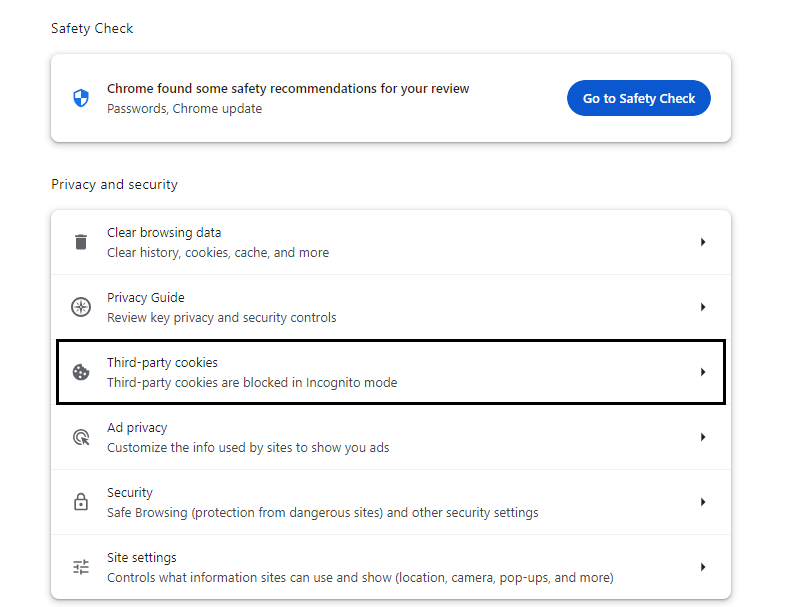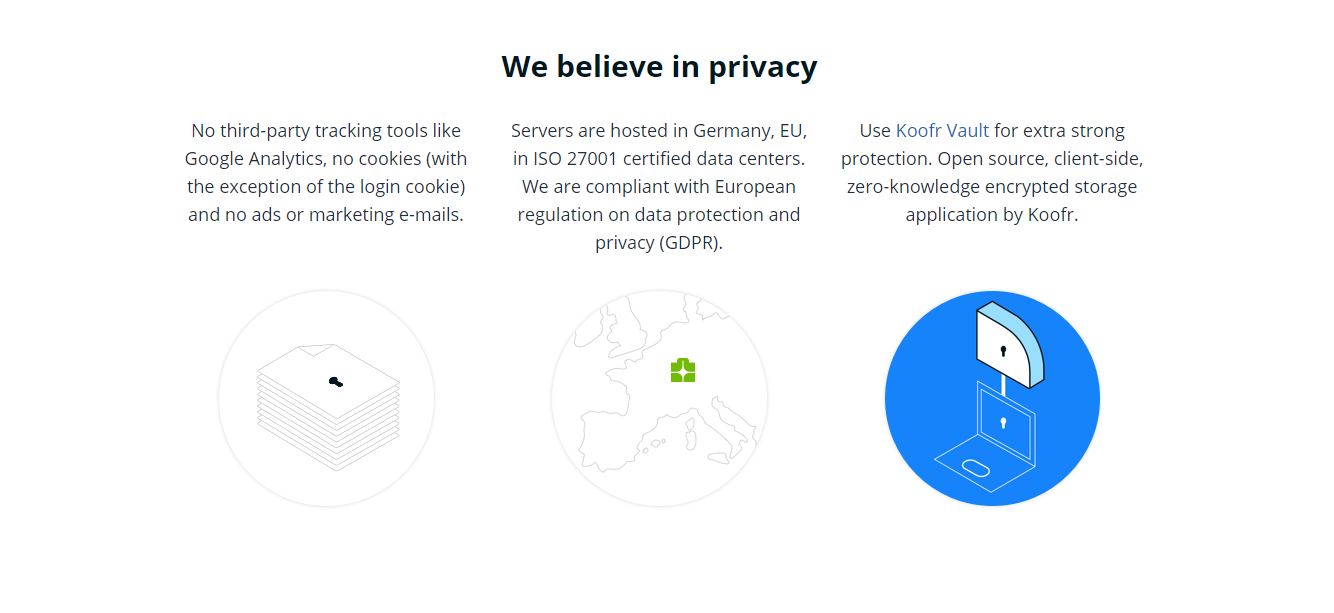The Cookie Apocalypse: What it Means for Your Online Privacy and Experience
Third-party cookies are currently tracking almost everything you do online. But you'll be happy to know that with the "Cookie Apocalypse", their era is slowly coming to an end. Browsers are gradually phasing out third-party cookies, prioritizing users' online privacy and changing the online user experience.
Written by human for humans
Have you ever experienced the sensation of being tracked online? Everywhere you browse, ads seem to pop up, almost as if they're tailing your every move? You are not imagining things. This is all thanks to third-party cookies, but their era is swiftly drawing to a close. The end of third-party cookies marks a big win for online privacy, changing the user experience for the better.

What are third-party cookies?
Third-party cookies are small pieces of data that have long been the backbone of targeted advertising, tracking our every move across the web. But now, major browsers are ushering in the "Cookie Apocalypse", phasing out these intrusive trackers.
Cookies are digital breadcrumbs left behind as you browse the internet. They play a crucial role in online advertising, enabling companies to tailor ads based on your browsing history and preferences, hindering your attempts at private browsing and online privacy along the way.
However, with the "Cookie Apocalypse" underway, the era of online tracking is coming to an end. Browsers like Chrome, Safari, and Firefox are blocking third-party cookies by default, finally prioritizing user privacy.
Unlike many services reliant on third-party cookies, the privacy-oriented cloud storage solution Koofr operates without them. Instead, it employs a session cookie solely to maintain user logins, ensuring privacy without compromising functionality.
Cookie apocalypse: A big win for online privacy and why does it matter?
Delving into the realm of online privacy reveals an intricate network of user data collection, frequently orchestrated by the subtle yet far-reaching methods of third-party cookies.
Third-party cookies relentlessly track user behavior across the internet, constructing complex user profiles from the threads of our online interactions. As you navigate from one website to another, third-party cookies lurk in the background, quietly observing your every click and scroll. With each interaction, they collect information on your interests, preferences, and habits. They gain data that paints a remarkably detailed portrait of who you are and what grabs your attention.
And while the allure of personalized content and tailored advertisements may initially seem harmless, the reality is far from that. The rapid and widespread growth of targeted advertising fueled by third-party cookies can often feel intrusive, as if we cannot do anything truly private online anymore. Think of it as all of your wishes and vulnerabilities up for sale to the highest bidder.
The effect of third-party cookies extends far beyond advertising. The risks connected with the existence of extensive collections of personal data pose a huge security threat, as evidenced by the alarming number of data breaches and cyberattacks in recent years. With each piece of information collected, the risk of exploitation and data misuse is present. But perhaps what is most concerning is what accompanies the age of third-party cookies – an era in which a visible loss of control over our online privacy and our digital lives appeared.
As our personal data is bought, sold, and traded across the digital marketplace, we find ourselves downgraded to spectators, powerless and without a say in how our information is used and how this affects our privacy. In the world of digital surveillance and data exploitation, the loss of online privacy has huge implications for our society.
As we navigate the digital age, the need for vigilance and advocacy in defense of our privacy rights has never been more urgent. The "Cookie Apocalypse" marks a step in the right direction towards gaining pieces of our online privacy back and presents a big win for privacy and its advocates as well as our society as a whole. Read more about the "Cookie Apocalypse" in the next paragraphs.

The cookie apocalypse: A new dawn for privacy
With the "Cookie Apocalypse", third-party cookie tracking faces imminent limitations, marking a new era where intrusive advertising and data collection will be limited. Some browsers have already taken steps in this direction.
Firefox and Safari have been at the forefront, while Google Chrome initiated the process of testing, in which they disabled third-party cookies for 1% of Chrome users globally in January of 2024. They will completely phase out cookies sometime in the first two quarters of the year 2025. However, the transition period might be prolonged as the industry adapts to these changes.
This shift brings several advantages for user privacy online. Firstly, it empowers users with greater control over their data, reducing the risk of unauthorized tracking and exploitation. The decline of third-party cookies also fosters a digital environment where advertising is less intrusive, more tailored to fit the context in which it appears and thus more relevant, rather than relying on intrusive methods of gathering personal data about individuals.
While the "Cookie Apocalypse" may alter the online landscape and with it the whole online user experience, it definitely represents a positive step towards a more respectful approach to user data. By prioritizing privacy and user consent, this evolution encourages a healthier online environment where individuals can interact and browse with greater assurance, freedom and independence knowing that their privacy is better protected and they have more control over their data and experiences.
Taking control of your online privacy: Browser settings and privacy-focused alternatives
Even now, before the "Cookie Apocalypse" fully takes effect, you follow a few simple steps and adjust your browser settings for more privacy-focused browsing experience. Open your browser's settings menu, which is usually found by clicking on the three-dot menu icon in the top-right corner of the browser window. Navigate to the privacy and security settings and look for options related to Third-party cookies. See the screenshot from Google Chrome privacy and security settings below.

In the Third-party cookies settings you'll find a few different options on how to handle third-party cookies.
- Allow third-party cookies which allows all cookies to be stored on your device. This can provide a seamless browsing experience while compromising privacy.
- Block third-party cookies which prevents third-party cookies from being stored on your device. While this reduces tracking and maximizes privacy, it may result in some websites not functioning properly.
- Block third-party cookies in Incognito mode.
- Sites allowed to use third-party cookies in Google Chrome or some other way to Manage cookie exceptions in other browsers, where you can specify certain websites to either allow or block cookies. This gives users more granular control over cookie behavior.
As an alternative to third-party cookie tracking, consider embracing privacy-focused solutions like:
- First-Party Data Collection with User Consent: Websites can rely on first-party cookies for essential functions while obtaining user consent for data collection. This approach ensures that data is collected transparently and only with user permission.
- Contextual Advertising: Instead of relying on tracking individuals across the web, contextual advertising focuses on delivering ads based on the content of the website being visited. This form of advertising respects user privacy while still providing relevant ad content. By adjusting your cookie settings in your browser and exploring privacy-focused alternatives, you can take proactive steps to safeguarding your online privacy while still enjoying a tailored browsing experience.
Koofr cloud storage: Cloud storage that prioritizes your online privacy
Koofr is a cloud storage solution developed with user privacy at its core. Unlike many other cloud storage providers, Koofr takes a firm stance against intrusive tracking and data collection practices.

At the heart of Koofr's privacy philosophy is its refusal to use third-party cookies. Instead, Koofr employs a minimalistic approach, utilizing only a session cookie to facilitate user logins. This means that your interactions with Koofr are not subjected to the online tracking mechanisms often found across the web.
This commitment to privacy not only distinguishes Koofr from its competitors but also aligns seamlessly with the principles that are driving the "Cookie Apocalypse". As major browsers move towards limiting third-party cookie tracking, Koofr's privacy-focused approach positions itself as a solutions aligned with user empowerment in an increasingly privacy-conscious digital world.
By choosing Koofr, users regain control over their data, free from the prying eyes of third-party trackers. With Koofr, your files remain securely stored in the cloud without compromising your data privacy.
The "Cookie Apocalypse" signifies a crucial advancement in safeguarding user privacy online. With it and the cookie phase out users will gain back the power to assert control of their data and their ability to browse privately, without the intrusive ads hindering their online experience. But, even now, users have the ability to affect their online privacy by simply adjusting their browser settings to disable third-party cookies and embracing privacy-focused digital solutions, like Koofr cloud storage. While with the "Cookie Apocalypse" the online landscape may undergo major changes, this transition is going into the positive direction for user privacy. It offers an opportunity for a more respectful treatment of user data, promoting a healthier digital ecosystem and a better online user experience.
Have you already disabled third-party cookies in your browser? Share your experience and opinion on Koofr subreddit!


